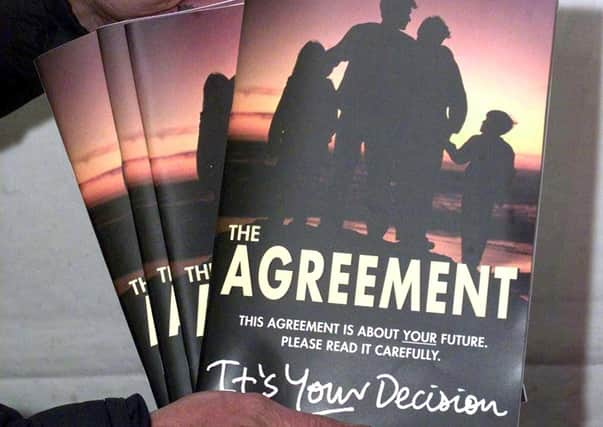Neil McCarthy: The Irish government should stand up for the core consent principles in the Good Friday Agreement


The 1914 gun running there was without doubt a seminal event in the eventual founding of Northern Ireland
Whilst some may be tempted to recall Karl Marx’s dictum about historical facts appearing twice — ‘the first time as tragedy, the second time as farce’ — there can be no doubt that unionism and loyalism are in a febrile state.
Advertisement
Hide AdAdvertisement
Hide AdIn such an atmosphere, all of us on this island should be grateful that Jim Allister has managed to defuse some of these tensions by uniting all of what might be called constitutional unionism behind his and Ben Habib’s judicial review proceedings announced last week.
Sadly, it is hard to feel such gratitude toward the Irish government, which has done much to stoke these tensions and too little to ease them.
When Simon Coveney insists that the Ireland/Northern Ireland Protocol is not “something that’s being imposed on Northern Ireland by the European Union”, and that all the problems currently being experienced by businesses and consumers in Northern Ireland are not the result of the protocol, but “the result of Brexit”, he is not merely being disingenuous; he is repeating the mistake the Irish government made in the immediate aftermath of the Brexit referendum in 2016, which was to refuse to recognise the legitimacy of its result.
The Irish government therefore should not be surprised that the protocol issue has moved decisively from a perhaps solvable technocratic issue as recently as a few weeks ago, where many unionists were still prepared to tease out the potential of a ‘best of both worlds’ approach, to one where the constitutional issue has now become paramount for all unionists.
Advertisement
Hide AdAdvertisement
Hide AdDublin doubtless thinks that the cack-handed EU invocation of Article 16 at the end of January is to blame for this shift in unionism’s perspective. The truth, however, is that the protocol has always been a constitutional issue, as the expert on Britain’s constitution, Vernon Bogdanor, recently pointed out in The Daily Telegraph.
London was of course well aware of this truth, and so all the more anxious to conceal it: thus it was in the dead of night last December that a critical change was made to the statute which incorporates the Good Friday/Belfast agreement into British law, without a single vote being solicited from any Northern Ireland public representative, nor indeed from any representative at all.
So-called Henry VIII powers were used by the Secretary of State for NI to amend a vital piece of primary constitutional statute law — merely by his own say-so. Thus what David Trimble, amongst others, saw as the crucial bulwark of cross-community consent — which would make the protocol subject to the democratic control of the assembly — was removed at the stroke of a pen.
Mainstream unionism colluded in this subterfuge at the time by saying nothing. It was Jamie Bryson who brought it to light a few weeks later via his Twitter account.
Advertisement
Hide AdAdvertisement
Hide AdWhen the British government sees fit to unilaterally interfere with the peace agreement which, for better or worse, has brought peace to this island and the right of the people of Northern Ireland to determine their own future, then it behoves the Irish government of all people to stand up and defend the core consent principles of that agreement.
Standing by Jim Allister in this instance rather than northern nationalism would show that they mean it when they say they want to share this island.
——— ———
A message from the Editor:
Thank you for reading this story on our website. While I have your attention, I also have an important request to make of you.
With the coronavirus lockdown having a major impact on many of our advertisers — and consequently the revenue we receive — we are more reliant than ever on you taking out a digital subscription.
Advertisement
Hide AdAdvertisement
Hide AdSubscribe to newsletter.co.uk and enjoy unlimited access to the best Northern Ireland and UK news and information online and on our app. With a digital subscription, you can read more than 5 articles, see fewer ads, enjoy faster load times, and get access to exclusive newsletters and content. Visit https://www.newsletter.co.uk/subscriptions now to sign up.
Our journalism costs money and we rely on advertising, print and digital revenues to help to support them. By supporting us, we are able to support you in providing trusted, fact-checked content for this website.
Alistair Bushe
Editor